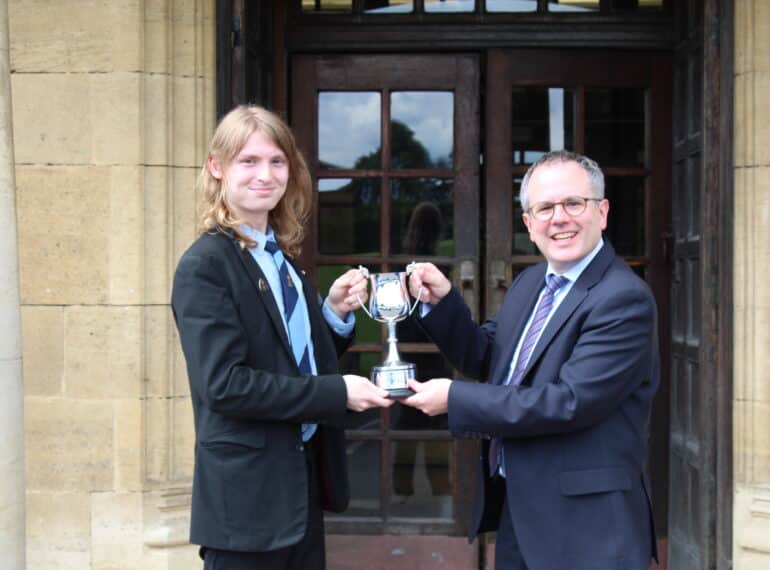
Broughton just pipped last year’s winner, Stapylton, to become QE’s champion House, with 1,592 points, against Stapylton’s 1,589.
Headmaster Neil Enright presented the Eric Shearly House Cup to Broughton’s leaders as the climax to the traditional end-of-year assembly.
 “My congratulations go to House Captain Robin Bickers, Deputy House Captain Zeyuan Wu, and to all the members of Broughton House,” he said. “As the points totals attest, this was a closely fought contest. Points are amassed from many different areas of School life, and Broughton’s achievement thus demonstrates considerable commitment, as well as consistency across a broad range of endeavour.”
“My congratulations go to House Captain Robin Bickers, Deputy House Captain Zeyuan Wu, and to all the members of Broughton House,” he said. “As the points totals attest, this was a closely fought contest. Points are amassed from many different areas of School life, and Broughton’s achievement thus demonstrates considerable commitment, as well as consistency across a broad range of endeavour.”
Underne came third in this year’s competition.
The cup is awarded based on points that are awarded to QE’s six Houses throughout the academic year. They include points gained through a large number of House competitions. Points are also gained according to the total number of merits and good notes earned across the year groups.
Broughton has the distinction of being the only House named after an Old Elizabethan. William Grant Broughton was educated at QE in the late 18th century and was appointed Archdeacon of New South Wales in 1828, having been noticed and assisted by the Duke of Wellington. He went on to become the first (and only) Bishop of Australia of the Church of England.
The trophy Broughton received, the Eric Shearly Cup, is named after Eric Shearly (1920–2005), who dedicated 76 years of his life to QE, where he was both a pupil and a teacher. He was an enthusiastic advocate of extra-curricular activities, having himself been a highly successful QE athletics captain in the late 1930s.
The special assembly was introduced by Assistant Head (Pupil Involvement) Crispin Bonham-Carter, who leads the QE Flourish extra-curricular programme.
 He told the boys that QE Flourish this year included no fewer than 200 trips, 33 of them residential. Every single member of QE’s teaching staff took part in at least one School trip. Six hundred and fifty boys had seen a live show. In total, the programme had delivered 13,508 experiences to individual pupils, Mr Bonham-Carter said.
He told the boys that QE Flourish this year included no fewer than 200 trips, 33 of them residential. Every single member of QE’s teaching staff took part in at least one School trip. Six hundred and fifty boys had seen a live show. In total, the programme had delivered 13,508 experiences to individual pupils, Mr Bonham-Carter said.
The assembly celebrated many of the year’s achievements and House competitions. Areas covered included charity work; the environment (including autumn tree-planting and bulb-planting as part of the 2023 450th anniversary celebrations); EDI (equality, diversity and inclusion); QE Together (the pupil-led community partnership with Queen Elizabeth’s Girls’ School); debating; Music; chess; drama; and sport.
The boys were told that £500 was raised for the Noah’s Ark Hospice and another £500 for overseas charitable work, split between the School’s long-running Sai School Appeal supporting a rural school in Kerala, India, and Teach Sri Lanka, which supports the education of children from all communities and all backgrounds in that nation.
 The assembly also celebrated a busy year for the School’s musicians, who have been involved in eight concerts, QE’s May the fourth be almost with you Music festival, trips, charity performances, and this month’s tour to Vienna, as well as providing musical support for several formal School occasions.
The assembly also celebrated a busy year for the School’s musicians, who have been involved in eight concerts, QE’s May the fourth be almost with you Music festival, trips, charity performances, and this month’s tour to Vienna, as well as providing musical support for several formal School occasions.
With chess thriving at QE, especially in the lower years, there was the announcement of 20 boys winning junior colours, seven winning intermediate and seven winning senior, as well as a large number of commendations.
In sport, 23 teams represented the School this year. There were more than 119 fixtures, with a total of 407 different boys playing for QE.

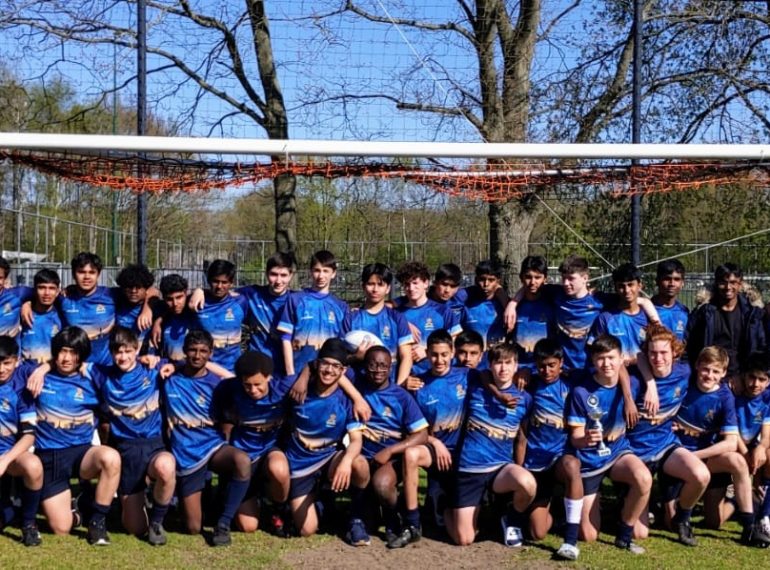
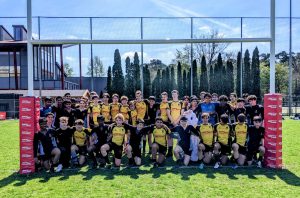 The short tour, resumed after a two-year break because of the pandemic, was previously open to Year 9, but this year was opened to Year 10 as well, attracting 23 players from each year group.
The short tour, resumed after a two-year break because of the pandemic, was previously open to Year 9, but this year was opened to Year 10 as well, attracting 23 players from each year group.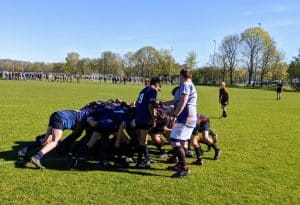 “Both age groups played RC Eemland teams on the Saturday. We won both matches and were hosted brilliantly by the club afterwards,” said Mr Clarke.
“Both age groups played RC Eemland teams on the Saturday. We won both matches and were hosted brilliantly by the club afterwards,” said Mr Clarke.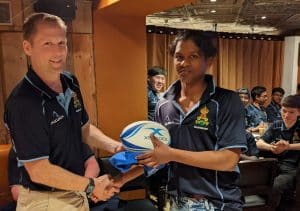 By contrast, the U14s from Year 9 enjoyed considerable success on the pitch and came second in their age group in the tournament after winning four of their matches and losing only one.
By contrast, the U14s from Year 9 enjoyed considerable success on the pitch and came second in their age group in the tournament after winning four of their matches and losing only one.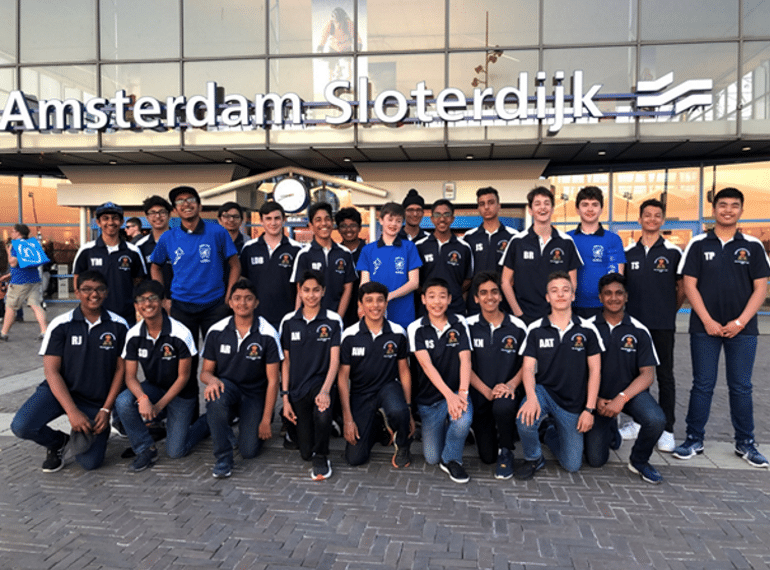
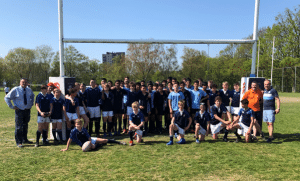 The 24-strong QE squad won three of their four matches in the U14 category of the 20th annual Hilversum International Youth Rugby Festival.
The 24-strong QE squad won three of their four matches in the U14 category of the 20th annual Hilversum International Youth Rugby Festival.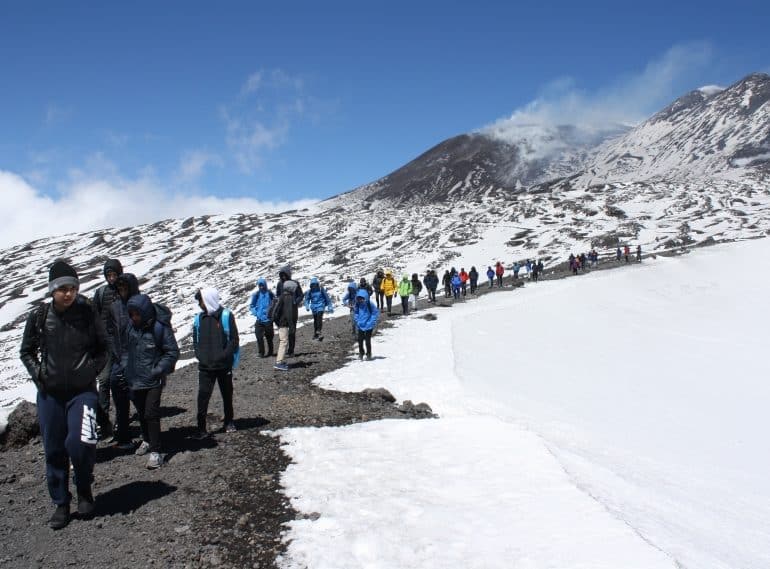
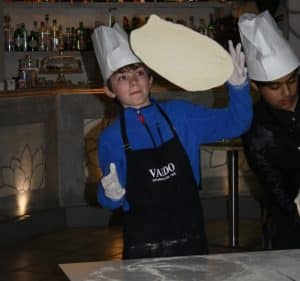 Forty-one boys from Years 7, 8 and 9 took part in the five-day trip led by Geography teacher Helen Davies, who was accompanied by four other members of staff.
Forty-one boys from Years 7, 8 and 9 took part in the five-day trip led by Geography teacher Helen Davies, who was accompanied by four other members of staff.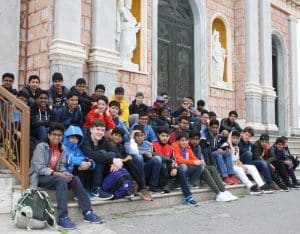 On the following day, after getting up at 5:30am, the boys set off for a full-day visit to the Aeolian Islands, a volcanic archipelago visible from Sicily.
On the following day, after getting up at 5:30am, the boys set off for a full-day visit to the Aeolian Islands, a volcanic archipelago visible from Sicily.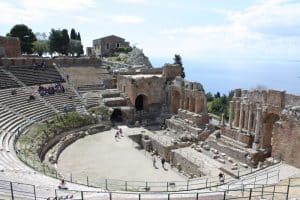 One evening activity popular with the boys was the visit to a restaurant, the Café Sikelia. There they not only learned about the history of the pizza and the different types available, but also had the chance to try their hand at making one themselves, before tucking into a pizza dinner.
One evening activity popular with the boys was the visit to a restaurant, the Café Sikelia. There they not only learned about the history of the pizza and the different types available, but also had the chance to try their hand at making one themselves, before tucking into a pizza dinner.